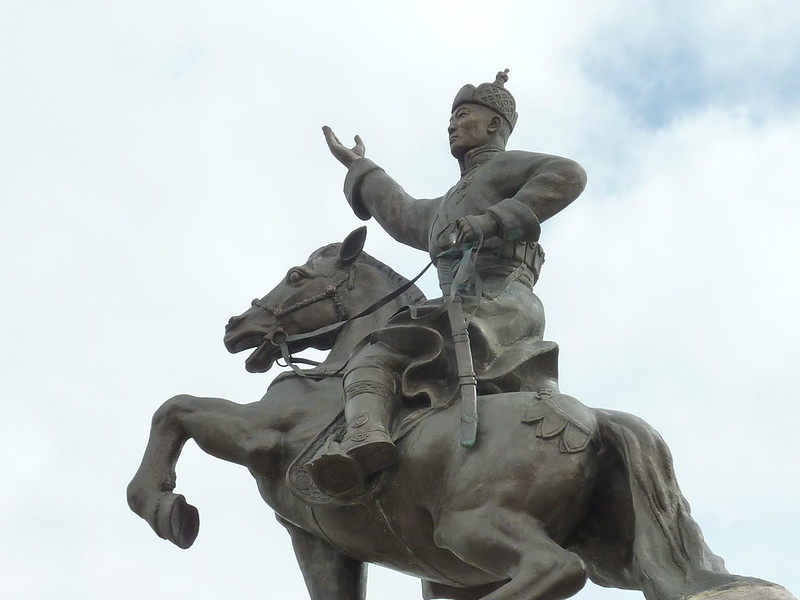China and Russia, Mongolia’s cumbersome, yet unavoidable neighbours
Pope Francis will deliver a much-awaited speech tomorrow before Mongolia’s authorities and the diplomatic corps in the State Palace in the Mongolian capital. Russia is the country's main energy supplier but 90 per cent of its exports go to China. Meanwhile, “new” partners are lining up, eager for access to its mineral riches, starting with strategic rare earths. During his visit, the pontiff hopes to encourage steps towards peace.
Ulaanbaatar (AsiaNews) – Francis’s trip to this corner of Asia where no pontiff has ever set foot is spiritually significant, an invitation to dialogue, but also carries great geopolitical importance.
Indeed, “Why does Pope Francis come here, to meet a Church made up of 1,500 people?” wonder some Catholics outside Ulaanbaatar cathedral. Their answer: “Well, we are the perfect expression of the peripheries to which he often refers, not to mention that we are right in between Russia and China...”
Such observations are shared by many in Mongolia; especially now. What is more, Sino-Vatican Vatican relations are a sensitive issue, while Pope Francis continues to seek ways towards peace after Putin's aggression against Ukraine.
Mongolia has always had close relations with its two big neighbours. The conflict with China along its southern border goes back to the empire founded by Genghis Khan (whose capital was moved to Beijing by Kublai Khan in 1264), while the Mongol khanate of the Golden Horde ruled in the north in what is now Russian territory.
Later, the Russians backed Mongolia’s breakaway from Qing China in the early 20th century, followed by 70 years of a close relationship with the Soviet Union.
Today, with Mongolia a democracy open to the world, Russia and China remain indispensable strategic partners. Russia in fact is Mongolia’s main energy supplier, while almost 90 per cent of its exports are destined for the Chinese market.
For Dondovdorj Batmunkh, former economic adviser to the prime minister (and now aide to Ulaanbaatar’s mayor), “coal is particularly crucial to us because most developed countries are moving towards renewable energy”.
Given the country’s reliance on Chinese roads and ports, for a landlocked country, "it is clear that we are completely dependent on the two states bordering us,” Batmunkh notes. Yet, Mongolia’s Prime Minister Luvsannamsrai Oyun-Erdene is determined to pursue a “Third Neighbour Policy”.
The latter refers to “the need to create alternative economic and political relations, which is what the prime minister is doing, for example with Japan and South Korea.” With Seoul, “the (Mongolian) government has recently signed a cooperation agreement to mine and sell copper and rare earths.”
Many in the West are also interested in Mongolia’s mineral riches: gold, copper, iron ore, zinc, and uranium. When President French Macron visited Ulaanbaatar last May on his way back from the G7 in Hiroshima, he and his Mongolian hosts focused their talks on uranium.
In a recent visit to Washington, Prime Minister Oyun-Erdene signed a deal with the United States to boost cooperation in rare earth mining and inked an “Open Skies” aviation agreement, allowing Mongolian Airlines to fly directly to the United States.
Despite this, "Ulaanbaatar's political approach must always remain cautious," Batmunkh warned. Last year for example, during the UN General Assembly vote condemning Russia’s aggression against Ukraine, Mongolia abstained.
Against this backdrop, Pope Francis will try to send some signals to the region, starting with his flight over China during which, as he usually does during his travels, he sent a telegram to China’s President Xi Jinping.
The pontiff will have many other opportunities to do so, like his first speech tomorrow morning, at the State Palace, addressing not only local officials but also the diplomatic corps, which includes Russian, Chinese and North Korean diplomats.
South of the border, in China, new restrictions on religion – “Rules on the management of sites of religious activities” – came into effect today. Coincidentally, a 30-member delegation has arrived in Mongolia from Hong Kong, led by cardinal-designate Stephen Chow, for the papal trip.
The “land of the eternal blue sky” thus plays a key role in regional politics, and beyond. It is no accident that Mongolia has been proposed as a venue for potential peace negotiations between Ukraine and Russia.
Francis will undoubtedly be receptive to this idea; for his part, Card Matteo Zuppi continues his peace mission on behalf of the Vatican.
Photo: Flickr / Ricardo Cabral
17/02/2023 17:39







.png)










